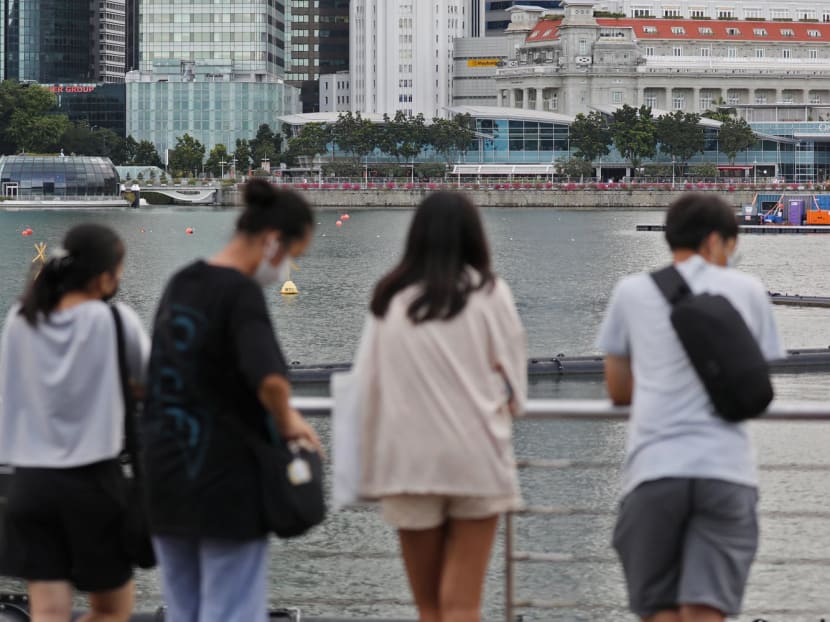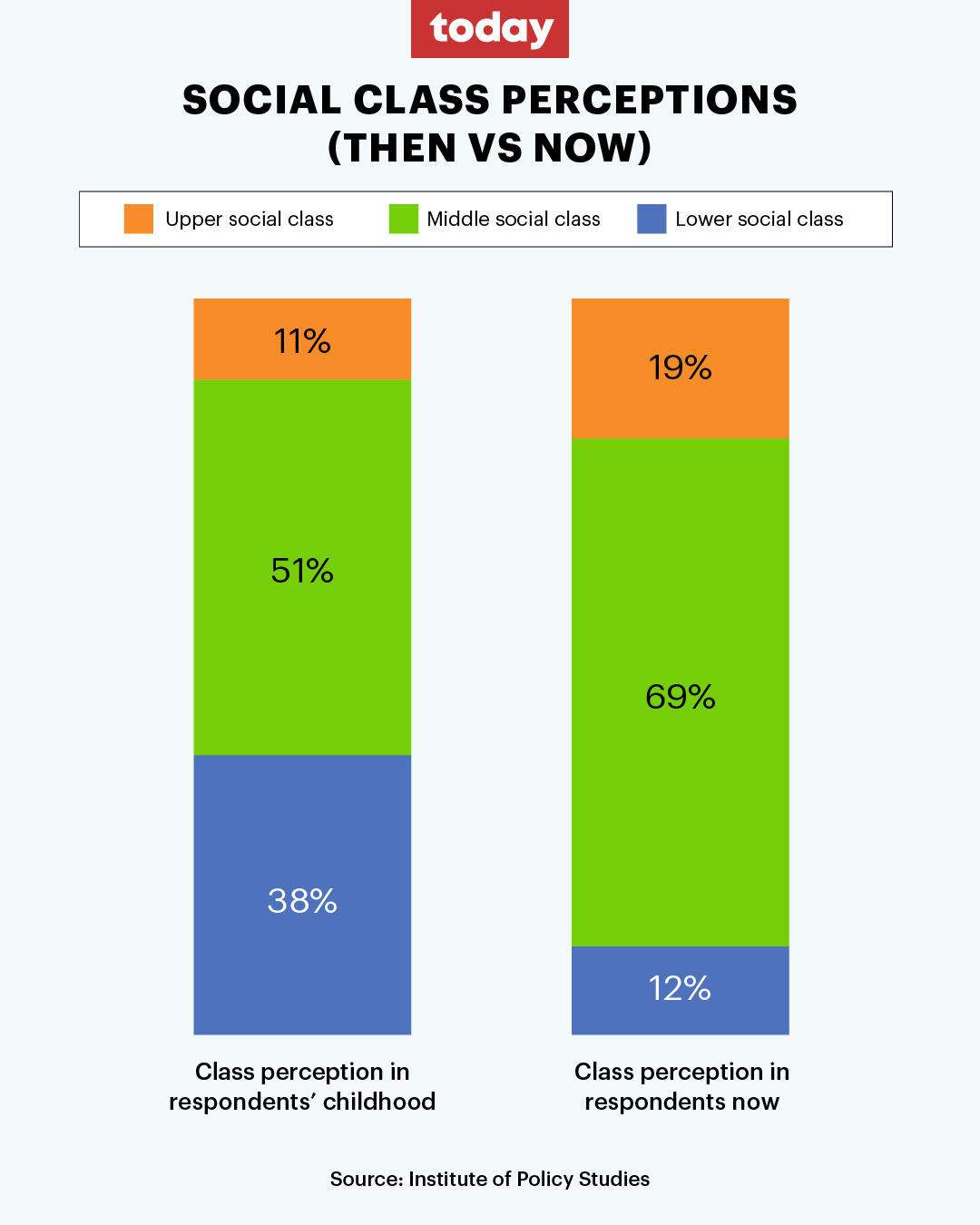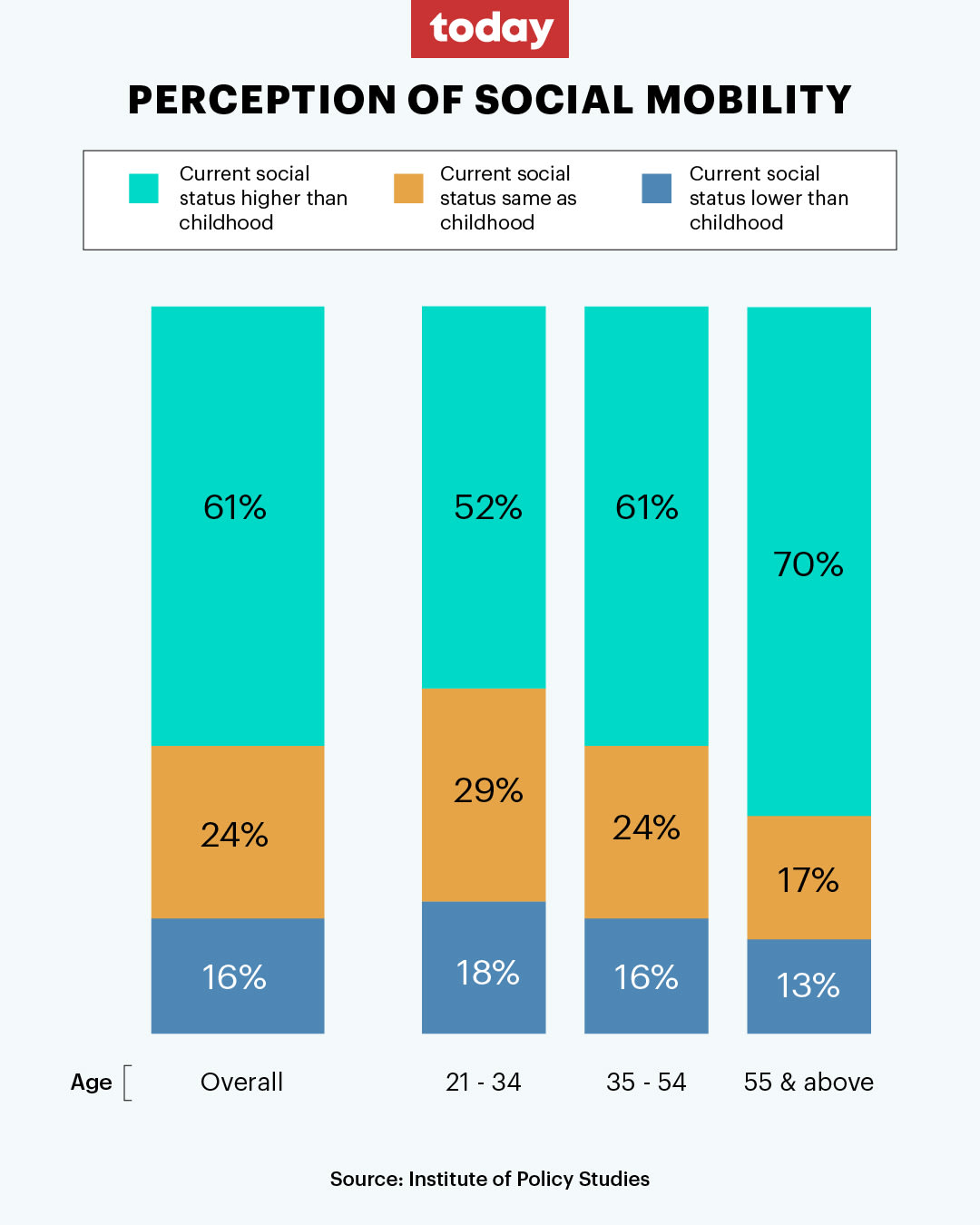- Joined
- Feb 26, 2019
- Messages
- 12,449
- Points
- 113
www.todayonline.com
 Raj Nadarajan/TODAY
Raj Nadarajan/TODAY
Youth in Singapore.
Follow us on Instagram and Tiktok, and join our Telegram channel for the latest updates.

Published January 16, 2023
SINGAPORE — Younger people between the ages 21 and 34 are less likely to have seen their social status rise, compared to those who are older, a study by the Institute of Policy Studies (IPS) released on Monday (Jan 16) showed.
The study, titled "Survey on Singapore workforce’s preparedness for the future of work, their work aspirations and perceptions of social mobility", showed that respondents aged 55 and above are more likely to have seen a rise in their social status.
Seven in 10 among this group do so, compared to 61 per cent of those aged between 35 and 54, and 52 per cent of those aged 21 to 34.
The study, which surveyed 1,010 working adult Singaporeans aged between 21 and 84 in October last year, took stock of social mobility in an effort to understand "how Singaporeans are likely to fare in jobs of tomorrow and where vulnerabilities may lie", a press release on the study said.
Social mobility and inequality in Singapore have been hot-button issues in recent years.
A report by the World Economic Forum in 2020 on social mobility found that despite outperforming its Southeast Asian neighbours, Singapore ranks 20th out of 82 countries surveyed.
 Infographic: Samuel Woo
Infographic: Samuel Woo
"The top rung (10) represents people with the most wealth, education and respected jobs, while the bottom rung (1) represents the most impoverished and least educated with the least respected or no jobs," IPS said.
Respondents were then asked to rank themselves on this ladder.
First, they were asked to recall their childhood circumstances at age 18 or earlier and provide a ranking, and then were asked to consider their present circumstance and provide a current ranking.
"An increase in 'ladder scores' from childhood to present circumstances suggests upward social mobility, and vice versa for a decrease in 'ladder scores'," IPS said.
The results were also broken down by age, and the breakdown showed that younger respondents are less likely to have seen upward mobility than older folk.
Dr Chew Han Ei, a senior research fellow at IPS and a co-author of the study, said: "The simple explanation is that (older respondents) have had more time to accumulate wealth, and also we know that in the past 50 years, Singapore has undergone massive improvements in mobility."
However, it may not be only time that makes it more difficult for young people to accumulate wealth compared to the older generations.
Deputy Prime Minister Lawrence Wong noted last year that among the concerns that Singapore faces is that social mobility is slowing, with people who have done well pulling further ahead of the rest due to their entrenched advantages.
Agreeing, Mr Ang Yew Shen, a 33-year-old director of sales at a wealth management firm, said that young people can still climb the social ladder.
"Sometimes it's not about the time, it's about the person — whether they are willing to take on and seek opportunities out there," he said.
 Infographic: Samuel Woo
Infographic: Samuel Woo
More respondents also placed themselves in the middle and upper social class brackets now.
About half of the respondents reported that they were in the middle social class, while 11 per cent were in the upper class when they were children. However, in their current lives, about seven in 10 said that they were in the middle social class and 19 per cent were in the upper class.
Singaporean youth less likely than older generations to have seen their social status rise: IPS study
SINGAPORE — Younger people between the ages 21 and 34 are less likely to have seen their social status rise, compared to those who are older, a study by the Institute of Policy Studies (IPS) released on Monday (Jan 16) showed.
Youth in Singapore.
Follow us on Instagram and Tiktok, and join our Telegram channel for the latest updates.
- A study by IPS showed that people between the ages 21 and 34 are less likely to have seen their social status rise than those who are older
- Researchers said that this could be because young people have had less time to accumulate wealth compared to the older generation
- However, slowing social mobility is still a concern here, with perceptions that it is more difficult for young people to accumulate wealth compared to the older generations

Published January 16, 2023
SINGAPORE — Younger people between the ages 21 and 34 are less likely to have seen their social status rise, compared to those who are older, a study by the Institute of Policy Studies (IPS) released on Monday (Jan 16) showed.
The study, titled "Survey on Singapore workforce’s preparedness for the future of work, their work aspirations and perceptions of social mobility", showed that respondents aged 55 and above are more likely to have seen a rise in their social status.
Seven in 10 among this group do so, compared to 61 per cent of those aged between 35 and 54, and 52 per cent of those aged 21 to 34.
The study, which surveyed 1,010 working adult Singaporeans aged between 21 and 84 in October last year, took stock of social mobility in an effort to understand "how Singaporeans are likely to fare in jobs of tomorrow and where vulnerabilities may lie", a press release on the study said.
Social mobility and inequality in Singapore have been hot-button issues in recent years.
Read also
Younger workers less willing to accept lower pay for benefit of family or personal life: IPS survey
In 2018, then-Deputy Prime Minister Tharman Shanmugaratnam urged Singaporeans to keep the “escalator” of social mobility moving. He warned that once it stops, those caught in the middle will be steeped in “pervasive anxiety” of not only trailing those advancing further, but also looking over their shoulder at those who are catching up.A report by the World Economic Forum in 2020 on social mobility found that despite outperforming its Southeast Asian neighbours, Singapore ranks 20th out of 82 countries surveyed.

HOW IPS TRACKED SOCIAL MOBILITY
The researchers used what is known as MacArthur’s Social Status Scale or MacArthur’s Ladder, where respondents were presented with an image of a ladder with 10 rungs and asked to imagine that it represents their society."The top rung (10) represents people with the most wealth, education and respected jobs, while the bottom rung (1) represents the most impoverished and least educated with the least respected or no jobs," IPS said.
Respondents were then asked to rank themselves on this ladder.
First, they were asked to recall their childhood circumstances at age 18 or earlier and provide a ranking, and then were asked to consider their present circumstance and provide a current ranking.
"An increase in 'ladder scores' from childhood to present circumstances suggests upward social mobility, and vice versa for a decrease in 'ladder scores'," IPS said.
Read also
Ethnic self-help groups still relevant for Singapore, especially as social mobility gets 'tougher to sustain': PM Lee
The study found that overall, six in 10 respondents reported higher scores now, meaning that they experienced upward social mobility compared to childhood. This compared to 24 per cent who reported no change in scores, and 16 per cent who reported a decrease in scores.The results were also broken down by age, and the breakdown showed that younger respondents are less likely to have seen upward mobility than older folk.
Dr Chew Han Ei, a senior research fellow at IPS and a co-author of the study, said: "The simple explanation is that (older respondents) have had more time to accumulate wealth, and also we know that in the past 50 years, Singapore has undergone massive improvements in mobility."
However, it may not be only time that makes it more difficult for young people to accumulate wealth compared to the older generations.
Deputy Prime Minister Lawrence Wong noted last year that among the concerns that Singapore faces is that social mobility is slowing, with people who have done well pulling further ahead of the rest due to their entrenched advantages.
Agreeing, Mr Ang Yew Shen, a 33-year-old director of sales at a wealth management firm, said that young people can still climb the social ladder.
Read also
Meritocracy is under siege. Here are three ways Singapore can overcome its limitations
They can succeed by thinking out of the box and knowing how to market themselves or their products through sales and on social media, for instance."Sometimes it's not about the time, it's about the person — whether they are willing to take on and seek opportunities out there," he said.

DIFFERENT PERCEPTIONS OF SOCIAL CLASS OVER TIME
The rungs on the ladder were divided into different brackets:- Rungs one to four were classified as the lower social status bracket
- Rungs five to seven were the middle bracket
- Rungs eight to 10 represented the upper class
More respondents also placed themselves in the middle and upper social class brackets now.
About half of the respondents reported that they were in the middle social class, while 11 per cent were in the upper class when they were children. However, in their current lives, about seven in 10 said that they were in the middle social class and 19 per cent were in the upper class.


